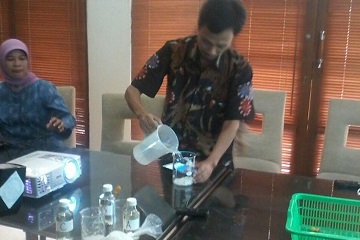Innovation Made by IPB for Salt Problem Solving in Indonesia

Institut Pertanian Bogor (IPB Bogor Agricultural University) introduced technology for rapid deposition of salt, which has a NaCI content of 99.78 percent. The Indonesian regulation on quality and other requirements for salt for human consumption stated that salt quality No.1, NaCl 98 percent, maximum water content 4 percent; quality No.2, NaCl 94 percent and maximum water content 5 percent; Quality No.3, NaCl 94 percent and moisture content 55.
The technology is multi-stage precipitation technology. This year the project will start to be tested on the scale of ponds. This joint project will be carried out between IPB and Universitas Trunojoyo, Bangkalan, Madura. The University has been appointed by the Ministry of Research, Technology and Higher Education (Kemenristekdikti) RI as a leading centre of the science and technology for salt.
Salt researcher from the Department of Chemistry, Faculty of Mathematics and Natural Sciences of Bogor Agricultural University (FMIPA IPB), Dr. Muhamad Khotib, explained the characteristics of this low-grade salt produced by small-scale farmers has a level of NaCl 85-97 percent (dry base), so it does not meet the standards. Locally made salt is often the product of small-scale farmers who use traditional harvesting methods that can only produce medium and low quality salt unsuitable for industrial purposes. "Generally, the salt of farmers is below standard, so it is not acceptable for the industry, basically for the salt of standard consumption is not a problem as long as it does not contain heavy metal," he said at a press conference held by Directorate of Agricultural Policy and Policy Studies of IPB. at IPB Campus, Baranangsiang, Bogor, on 4 August 2017.
Poor salt production stemmed from the performance of the Ministry of Maritime Affairs and Fisheries, Ministry of Industry, Ministry of Trade, and state-owned salt firm PT Garam, which had failed to encourage the production of the commodity and improve the welfare of salt farmers. Further he explained that the scarcity of salt in Indonesia at this time because constrained weather, intense rainfall that left salt farmers few days for crystallization under the sun, plus no stock from farmers, because farmers are not ready for harvest.
Dr. Muhamad Khotib stated that salt production rely heavily on temperature, solar heat and wind. Indonesia imports a lot of salt from Australia. However, due to the different temperatures and weather with Indonesia, where Australia is cooler, so the process of salt crystallization will be faster, so the production of salt in Australia will be faster.
With the innovations he made, Dr. Mohammed Khotib stated, in time of bad weather salt be stored in Crystallization Houses, thus the simple technology will help Indonesia to solve salt problem.
He added that the government should focus more on overcoming the salt problem, especially in improving quality and quantity the meet the market standard.
Similar statement was stated by Vice Rector for Resources and Strategic Studies of IPB, Prof. Dr. Hermanto Siregar. He said that salt is a strategic issue, although its production costs is cheaper than other basic needs. " Everyone needs salt for fluid balance and muscle and nerve function. We can’t delay in meeting its needs," he said.
According to him, in the long and medium term, the government should be serious about this issue.
Prof. Hermanto expected that the technology he promoted will enable Indonesia to be salt exporting country in near future. In addition, this technology can be adopted by cooperatives and private companies. (Wied)



